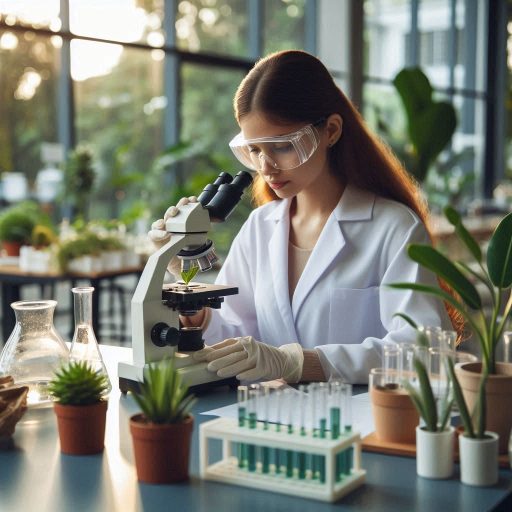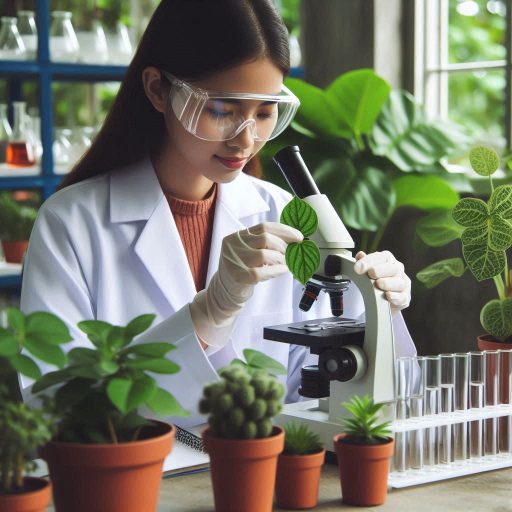Introduction
Plant science plays a vital role in addressing global challenges.
It impacts food security, environmental sustainability, and climate resilience.
As the world faces pressing issues, innovative research in plant science becomes increasingly essential.
In recent years, more women have entered the field of plant science.
This trend reflects the growing recognition of women‘s contributions to research and innovation.
Women bring diverse perspectives and skills to the scientific community.
Their involvement enhances collaboration and fosters creativity in problem-solving.
Numerous women have made significant contributions to plant science throughout history.
Pioneers like Beatrix Potter and Ellen Hutchins laid the groundwork for future researchers.
Today, modern scientists continue to push boundaries in plant genetics, biotechnology, and sustainable agriculture.
Female leaders such as Jane Goodall and Hope Jahren inspire the next generation.
As the number of women in plant science increases, their impact becomes more pronounced.
Their groundbreaking research addresses critical issues like climate change and food security.
This growing presence highlights the importance of diversity in scientific fields.
Women play a crucial role in shaping the future of plant science.
We must celebrate their contributions and encourage more women to join this vital field.
Early Pioneers in Plant Science
Women have played a significant role in advancing plant science, often overcoming considerable obstacles.
Their groundbreaking discoveries have shaped the field and inspired future generations.
Early pioneers like Beatrix Potter and Ellen Hutchins made notable contributions despite facing a male-dominated environment.
Women who made groundbreaking discoveries in plant science
Beatrix Potter is best known for her beloved children’s books, but she was also a skilled botanist.
Her illustrations and observations of fungi, plants, and animals showcased her scientific talent.
Potter conducted her research in the late 19th century when few women could pursue careers in science.
She faced societal expectations that limited women’s roles in academia and research.
Nevertheless, Potter’s meticulous studies and published papers contributed to mycology, the study of fungi.
Her work laid the foundation for future botanists and emphasized the importance of careful observation.
Ellen Hutchins, another trailblazer, became the first woman to study and document Irish botany in the early 19th century.
She focused on algae and flowering plants, meticulously cataloging species and their habitats.
Hutchins faced significant barriers, including limited access to formal education and professional networks.
Despite these challenges, she corresponded with prominent botanists and shared her findings with the scientific community.
Her dedication to plant science helped elevate the status of women in the field.
The challenges they faced in a male-dominated field
Both women encountered skepticism from their male counterparts, who often dismissed their contributions.
They worked tirelessly to prove their worth in a field dominated by men.
Beatrix Potter and Ellen Hutchins forged paths for themselves while inspiring others to follow.
Their tenacity and passion for plant science defied societal norms and opened doors for future female scientists.
In addition to their scientific achievements, both women faced personal struggles.
Beatrix Potter struggled with health issues and societal pressures while maintaining her scientific interests.
Ellen Hutchins dealt with family responsibilities, yet she remained dedicated to her botanical pursuits.
Their perseverance in overcoming obstacles is a testament to their strength and determination.
Examples include Beatrix Potter and Ellen Hutchins
The stories of early pioneers like Potter and Hutchins illustrate the importance of gender diversity in plant science.
Their groundbreaking discoveries continue to inspire women today.
By sharing their experiences and achievements, we can encourage more women to enter STEM fields.
Early pioneers in plant science, such as Beatrix Potter and Ellen Hutchins, made remarkable contributions despite significant challenges.
Their stories inspire future generations of women in science.
By promoting gender diversity in STEM, we honor their legacy and pave the way for continued progress in plant science.
Read: Challenges and Rewards: The Dual Life of an U.S. Environmental Scientist
Modern Women Leading the Way
Today, many women lead the charge in plant science, making significant contributions to various fields.
These modern female scientists drive innovative research and inspire future generations.
Their work in plant genetics, ecology, and biotechnology demonstrates the importance of gender diversity in scientific research.
Current female scientists who are making strides in plant science
Jane Goodall is a renowned primatologist and conservationist, but her work extends to plant science.
Goodall‘s research emphasizes the connection between plants and ecosystems.
She advocates for biodiversity and sustainable agriculture.
Her efforts highlight how protecting plant life can support entire ecosystems.
Goodall’s approach shows how interconnected all living organisms are and underscores the importance of plant conservation.
Hope Jahren is a prominent geobiologist and author known for her groundbreaking research in plant biology.
She studies the physiology of trees and their role in climate change.
Jahren’s work reveals how plants adapt to changing environments.
Her innovative research combines scientific rigor with engaging storytelling.
She encourages young scientists to pursue their passions and highlights the importance of mentorship.
Jahren‘s books inspire many to appreciate the beauty of plants and their ecosystems.
Profiles of researchers conducting innovative research in plant genetics, ecology, and biotechnology
Dr. Amanda Reiter focuses on plant genetics and breeding.
Her research aims to develop disease-resistant crops through genetic engineering.
Reiter works on improving crop yields while reducing the need for harmful pesticides.
Her innovative approaches enhance food security and promote sustainable agriculture.
She collaborates with various organizations to ensure her research benefits farmers worldwide.
Dr. Frances Arnold is a pioneer in the field of synthetic biology.
Her work in protein engineering has led to significant advancements in plant biotechnology.
Arnold’s research enables the development of crops with enhanced traits, such as drought resistance and improved nutrition.
She emphasizes the need for diverse perspectives in scientific research.
Her leadership encourages more women to enter STEM fields and pursue careers in plant science.
Dr. Jennifer Doudna is another influential figure in modern plant science.
She co-invented CRISPR technology, revolutionizing genetic editing.
Doudna‘s research allows scientists to modify plant genomes with precision.
This innovation opens new doors for creating resilient crops capable of withstanding climate challenges.
Doudna advocates for ethical considerations in genetic research, promoting responsible use of technology in agriculture.
Examples include Jane Goodall and Hope Jahren
The contributions of these modern women in plant science underscore the need for continued support and encouragement.
Their work demonstrates how diversity enhances creativity and innovation in research.
As more women enter plant science, the field will continue to flourish.
Modern female scientists lead the way in plant science, driving innovative research and inspiring future generations.
Their efforts highlight the importance of gender diversity in science, ultimately benefiting our planet.
Supporting these trailblazers will ensure a brighter future for plant science and sustainability.
Read: Job Market Trends: Future of Chemistry Jobs in America
Diversity in Plant Science
Diversity and inclusion play critical roles in advancing plant science.
They enhance creativity, innovation, and problem-solving within the field.
Diverse perspectives lead to more comprehensive solutions to global challenges.
As the world faces issues like climate change and food security, diversity in plant science becomes increasingly vital.
Importance of diversity and inclusion in the field of plant science
Diverse teams bring a variety of experiences and viewpoints.
This variety fosters collaboration and encourages fresh ideas.
Inclusivity allows scientists to approach problems from different angles.
It also helps identify and address biases in research and practice.
Increasing diversity improves research quality and ensures broader impacts on society.
Plant science needs diverse voices to tackle complex challenges effectively.
Initiatives and organizations supporting women and underrepresented groups in plant science
Many organizations actively promote diversity and inclusion in plant science.
The American Society of Plant Biologists (ASPB) advocates for equity in the plant science community.
They offer programs aimed at supporting underrepresented groups.
ASPB hosts workshops, grants, and mentorship opportunities to empower women and minorities in the field.
The Plant Biology Education Network (Pben) focuses on creating an inclusive environment in plant biology education.
They provide resources and strategies to improve diversity in academic programs.
Pben emphasizes the importance of inclusive curricula and teaching practices.
The Society for Advancement of Chicanos/Hispanics and Native Americans in Science (SACNAS) also promotes diversity in STEM fields.
They support underrepresented groups in scientific careers through mentorship and networking opportunities.
SACNAS encourages collaboration among scientists from diverse backgrounds, fostering a sense of community.
Examples of successful programs promoting diversity in STEM fields
Several successful programs have emerged to promote diversity in plant science.
The National Science Foundation (NSF) offers funding for projects aimed at increasing diversity in STEM.
Their initiatives focus on engaging underrepresented groups in research and education.
By providing grants, the NSF supports universities and organizations that implement diversity-focused programs.
The STEM Diversity Network connects students with mentorship and networking opportunities.
This network aims to encourage young scientists from diverse backgrounds.
They organize workshops, seminars, and conferences to foster community engagement.
The Women in Science and Engineering (WISE) program provides support and resources for women pursuing careers in science.
WISE encourages female students to enter plant science and other STEM fields.
They offer scholarships, mentorship, and professional development opportunities.
Diversity and inclusion in plant science are essential for innovation and problem-solving.
Various organizations and initiatives actively support underrepresented groups in the field.
Programs promoting diversity in STEM create a brighter future for plant science.
By fostering a more inclusive environment, we can address pressing global challenges more effectively.
Women in Plant Science Education
Women play a vital role in plant science education.
Their contributions as educators and mentors inspire the next generation of scientists.
Female role models encourage young girls to pursue careers in science.
They provide guidance, support, and visibility, which are crucial for fostering interest in STEM fields.
Female educators and mentors in plant science
Many women serve as influential educators in plant science.
Dr. Barbara Schaal is a prominent figure in plant biology.
She has made significant contributions to evolutionary biology and plant genetics.
Schaal inspires students through her teaching and research at Washington University in St. Louis.
Dr. Christine Jones is another leading figure in plant science education.
She focuses on regenerative agriculture and soil health.
Jones actively promotes sustainable practices that enhance plant growth.
Her engaging teaching style motivates students to explore environmental science.
Dr. Tessa Hill combines her expertise in plant science with oceanography.
She researches the impact of climate change on marine plants.
Hill emphasizes the importance of interdisciplinary approaches in education.
Her work inspires students to consider how plants interact with various ecosystems.
Impact of women role models in encouraging young girls to pursue careers in science
Female role models significantly impact young girls‘ interest in science.
They provide relatable examples of success in male-dominated fields.
Role models demonstrate that women can excel in scientific careers.
Their presence encourages girls to envision themselves in similar roles.
Studies show that having female mentors increases girls’ confidence in pursuing STEM careers.
This support helps dismantle stereotypes and fosters a more inclusive environment in science.
Examples of programs and initiatives promoting STEM education for girls
Several initiatives promote STEM education specifically for girls.
The National Girls Collaborative Project connects organizations focused on encouraging girls in STEM.
This project helps share resources, best practices, and successful strategies.
By collaborating, these organizations amplify their impact on young girls.
Girls Who Code is another impactful organization.
They aim to close the gender gap in technology and computer science.
Their programs offer coding classes, summer camps, and mentorship opportunities.
By empowering girls with coding skills, they inspire future innovators.
The STEMettes initiative targets young girls interested in STEM careers.
This program offers workshops, events, and networking opportunities.
It connects girls with female role models working in various STEM fields.
The STEMettes demonstrate that women can succeed in science and technology.
The National Science Foundation’s (NSF) STEM for Girls initiative focuses on increasing participation among girls in STEM.
NSF supports programs that create engaging educational experiences for girls.
They emphasize hands-on learning and real-world applications of science.
Women in plant science education serve as powerful role models.
Their impact encourages young girls to pursue careers in science.
Various programs and initiatives support girls‘ STEM education.
By promoting female educators and mentors, we can create a more inclusive and diverse future in plant science.
Read: Challenges and Rewards: Navigating the Chemist Career Path
Transform Your Career Today
Unlock a personalized career strategy that drives real results. Get tailored advice and a roadmap designed just for you.
Start Now
Challenges and Barriers
Women in plant science face significant challenges.
These obstacles often stem from gender bias and a lack of representation.
The male-dominated environment can hinder women’s progress in their careers.
Many women experience difficulties in securing funding and resources for their research.
They may also face skepticism about their capabilities based on gender.
Obstacles that women face in plant science
Gender bias manifests in various ways within the scientific community.
Women often receive less recognition for their contributions compared to their male counterparts.
This disparity can lead to feelings of isolation and discouragement.
Furthermore, the lack of female role models limits young women’s aspirations.
They may not see themselves reflected in leadership positions.
The hiring process can also present challenges.
Women may encounter unconscious bias during interviews and evaluations.
This bias can affect their chances of being hired or promoted.
Additionally, workplace cultures may not always support work-life balance.
This environment can create stress for women who juggle multiple responsibilities.
Ways to overcome these challenges and create a more inclusive environment
Organizations must actively address gender bias.
They can implement training programs that promote awareness and sensitivity.
By educating staff, institutions can reduce unconscious bias in hiring and promotions.
Additionally, mentoring programs can help women navigate their careers.
Pairing experienced professionals with younger women fosters a supportive network.
Flexible work policies also create a more inclusive environment.
Allowing remote work or flexible hours can help women balance their responsibilities.
Institutions should provide resources for professional development.
Workshops, conferences, and networking opportunities can empower women in plant science.
Examples of strategies for supporting women in STEM fields
Several successful strategies exist to support women in STEM fields.
The Association for Women in Science (AWIS) offers resources for professional development and networking.
This organization promotes women’s advancement in STEM through mentorship and advocacy.
The Society for Advancement of Chicanos/Hispanics and Native Americans in Science (SACNAS) focuses on diversity in STEM.
They support women and underrepresented groups through scholarships and mentorship programs.
Their initiatives help create a more equitable scientific community.
Women in Science and Engineering (WISE) promotes gender equality in various scientific fields.
Their programs emphasize education, mentorship, and networking opportunities.
WISE collaborates with institutions to develop policies that support women.
The National Science Foundation (NSF) also offers grants specifically for projects that promote diversity in STEM.
These initiatives help fund programs aimed at increasing female participation in scientific fields.
Women in plant science face numerous challenges.
Gender bias and a lack of representation hinder their progress.
However, organizations can take significant steps to create a more inclusive environment.
Implementing training programs, providing flexible work policies, and fostering mentorship can help overcome these obstacles.
By supporting women in STEM, we can ensure a more diverse and innovative future in plant science.
Read: Diverse Career Paths: From Chemist to Patent Attorney in the US
Uncover the Details: Geologist Salaries: What to Expect in the USA
Women Making Waves in Agriculture
Women play a crucial role in sustainable agriculture and food security.
Their contributions significantly impact agricultural practices worldwide.
Many women lead efforts in innovative farming methods that promote sustainability.
They address pressing issues such as climate change, soil degradation, and food scarcity.
The role of women in sustainable agriculture and food security
Women often serve as primary producers in agricultural communities.
They manage farms and make essential decisions regarding crop production.
Their involvement in sustainable agriculture promotes practices that conserve resources.
Women also contribute to food security by improving local food systems.
Their work enhances nutritional outcomes for families and communities.
Women in agriculture often advocate for environmentally friendly practices.
They promote organic farming, crop diversification, and permaculture techniques.
These practices help restore ecosystems and protect biodiversity.
By implementing sustainable practices, women ensure the long-term viability of agriculture.
Female leaders in agricultural research and innovation
Many female leaders excel in agricultural research and innovation.
Dr. Akinwumi Adesina, the President of the African Development Bank, champions agricultural transformation in Africa.
Her initiatives focus on food security and empowering women farmers.
She emphasizes the importance of investing in agriculture to achieve sustainable development.
Dr. Julie Howard, former Chief Scientist at the United States Agency for International Development (USAID), advances global food security.
She focuses on research that improves agricultural productivity.
Her work significantly impacts policy decisions related to food and nutrition.
Another influential figure is Dr. Vandana Shiva, an environmental activist and scholar.
She promotes biodiversity and sustainable farming practices.
Shiva advocates for women’s rights in agriculture, emphasizing their essential role in food systems.
Her initiatives empower women to participate in agricultural decision-making.
Examples of women making a difference in agribusiness and food production
Numerous women are making a difference in agribusiness and food production.
Alicia E. W. Huerta, a farmer and entrepreneur, uses sustainable practices on her farm.
She focuses on regenerative agriculture techniques that restore soil health.
Huerta educates other farmers on sustainable methods and practices.
Hannah Jones, a co-founder of a sustainable food company, promotes ethical sourcing and production.
Her company partners with local farmers to provide fresh produce.
Jones advocates for fair trade practices that support farmers and their communities.
Dr. Ruth Oniang’o, a nutritionist and food security advocate, emphasizes the link between agriculture and nutrition.
She founded a non-profit organization focused on improving food systems in Africa.
Oniang’o‘s work addresses malnutrition and promotes sustainable agricultural practices.
Women play an integral role in sustainable agriculture and food security.
Their leadership in research, innovation, and agribusiness drives significant change.
By highlighting the contributions of female leaders, we can inspire future generations.
Supporting women in agriculture is essential for achieving a sustainable and secure food system.
Future Perspectives
Women in plant science have exciting opportunities ahead.
As the demand for sustainable practices grows, their roles become increasingly vital.
The field of plant science continually evolves, providing ample room for advancements and innovations.
Female scientists can drive solutions to global challenges like food security and climate change.
Opportunities for women in plant science and the potential for further advancements in the field
Women can pursue diverse careers within plant science.
They can work in research, education, policy-making, and agribusiness.
Emerging technologies such as CRISPR and genomics open new avenues for female researchers.
These tools enable women to conduct groundbreaking research on plant genetics and traits.
Additionally, women can contribute to improving crop resilience and yield.
Collaborations between women and established institutions can enhance research outcomes.
Partnerships with agricultural organizations can lead to impactful projects.
Such collaborations increase visibility and help promote women in leadership positions.
The future holds great promise for women who embrace these opportunities.
Importance of mentorship and support networks for women in STEM
Mentorship plays a crucial role in advancing women‘s careers in plant science.
Experienced mentors provide guidance and support to young female scientists.
They can help navigate challenges and foster professional growth.
Mentorship programs encourage networking and collaboration among women.
Support networks also play a significant role in encouraging women in STEM.
Organizations dedicated to promoting women in science create valuable resources.
They provide workshops, conferences, and training programs to build skills.
These networks foster a sense of community, allowing women to share experiences and knowledge.
Examples of emerging trends and research areas in plant sciences
Several emerging trends shape the future of plant sciences.
Research in sustainable agriculture focuses on environmentally friendly practices.
Female scientists contribute to this research by exploring innovative solutions.
Additionally, studies on plant-based proteins gain attention due to rising vegetarian and vegan diets.
Plant biotechnology continues to evolve, offering exciting opportunities for women.
Advances in genetic engineering enable the development of resilient crop varieties.
Female researchers can lead efforts in improving crop tolerance to pests and diseases.
This research will help secure food sources for future generations.
Another trend is the study of urban agriculture and vertical farming.
Women can play vital roles in designing and implementing these systems.
Urban agriculture addresses food access issues in densely populated areas.
This growing field presents significant career opportunities for women in plant science.
The future of plant science holds great potential for women.
With support from mentorship and networks, they can thrive in this field.
Emerging trends and technologies will shape their careers, driving meaningful change.
Women will continue to make significant contributions to plant science and sustainable agriculture.
Conclusion
Women have made remarkable contributions to plant science throughout history.
Their groundbreaking research has transformed agriculture and environmental practices.
Female scientists have addressed critical issues like food security and climate change.
Their work continues to inspire future generations.
We must support and promote women in STEM fields actively.
Creating an inclusive environment benefits everyone and fosters innovation.
Mentorship programs and support networks play vital roles in empowering women.
These initiatives help build confidence and provide valuable resources.
Women should pursue careers in plant science with determination.
The field offers diverse opportunities for growth and impact.
Each woman‘s unique perspective can lead to groundbreaking discoveries.
As more women enter this field, they can drive change and make a difference.
Encouraging young girls to explore science can create a more equitable future.
We must celebrate female role models and their achievements in plant science.
Together, we can build a more inclusive community that champions diversity.
Let us inspire women to take up space in plant science and continue to innovate.
The future of our planet depends on their contributions and insights.




